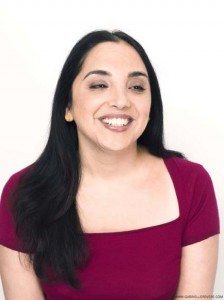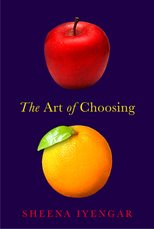Sheena Iyengar’s Art of Choosing
When Sheena Iyengar went to Spain, people sometimes came up and asked her for a lottery ticket. “Because that is what blind people do in Spain,” she explains. “They sell lottery tickets. And when I was in Japan, random people would come up to me and take my hands and start putting them on their backs or on their necks because they expect blind people to perform magical massages.”
These people would have been stunned to learn that though Iyengar is blind, she is a noted researcher, a professor at Columbia and the author of a critically acclaimed book ‘The Art of Choosing’, in which she dissects and analyzes choice – the ability one has to take on destiny – or even competing brands of cola.
In life, how much can you choose and how much is pre-destined? Can you fight circumstances or is your role pre-ordained? When faced with cultural mores or society’s expectations, do you acquiesce or should you chart out your own course? And if you have the power of choice, how do you choose wisely? In a world which is almost scary in its range of choices, how do you make the smart choice?
These are eternal questions we’ve all grappled with, and in her thought-provoking new book, she writes, “Choice, ranging from the trivial to the life-altering, in both its presence and its absence, is an inextricable part of our life stories.”
Sheena Iyengar, who is the S.T. Lee Professor of Business at Columbia University and a leading expert on choice, has topnotch credentials. A graduate of the Wharton School of Business and a recipient of the Presidential Early Career Award, she has a doctorate in psychology from Stanford, and her groundbreaking work has been funded by major institutions and cited in the media.

Sheena Iyengar’s Story
Since childhood, she started losing her eyesight and by the age of 18 was completely blind. How this child of Sikh immigrant parents overcame the restrictions of cultural conditioning and roles to rewrite the script of her own life is what makes this book particularly intriguing. Her own story is woven into her meticulous research and draws you into engrossing studies conducted amongst ordinary people, from preschoolers to shoppers in supermarkets. As she writes, “Choice, ranging from the trivial to the life-altering, in both its presence and its absence, is an inextricable part of our life stories.”
In ‘The Art of Choosing’ Iyengar documents many different studies and takes us into many different worlds to show the power of choice. How much control we have is determined by how much control we perceive we have: “Whether the bars are real or metaphorical, when one has no control, it is as if nothing exists beyond the pain of this loss.”
She goes on to say that “Unlike captive animals, people’s perceptions of control or helplessness aren’t entirely dictated by outside forces. We have the ability to create choice by altering our interpretations of the world.”
So much is in the mind and she writes, “One could even argue that we have a duty to create and pass on stories about choice because once a person knows such stories they can’t be taken away from him. He may lose his possessions, his home, his loved ones, but if he holds on to a story about choice, he retains his ability to practice choice.”
Face to Face with Sheena Iyengar
Q: In life, how much do you think is choice and how much destiny?
Sheena Iyengar: It’s a great question, right, because you could take any event in your life, you know when you were born or what happened in your life, you know what career you picked or whom you married and you could tell that story in terms of destiny or chance – or you could tell that story in terms of choice. And any one of those would be just as accurate as the other.
I think what happens is, depending on how you tell the story of your life, it shapes what you do next, so you know fate and chance free you from having to contemplate whether you should revise or exit out of whatever it is you are doing. You don’t think about that because that is obviously not a choice, and it forces you to contemplate how to adjust or make compromises based on whatever it is that life has dealt you, so to speak.
By contrast, if you think of the story of your life in terms of choice it is at once the most powerful tool we have in life, because it is the only thing we have that enables us to go from who we are today to whom we want to be tomorrow; but at the same time it is a burden, because we are constantly thinking about should I exit or should I continue? And I suppose that therein lies choice – its power and its mystery.
Q: I guess it is kind of a scary decision to make and if someone else makes the decision for you, you don’t have to row anymore, for the boat is taking you where you were destined to go. With choice at least you feel that you had a hand in your own destiny. So how much can you really control things?
Sheena Iyengar: I guess there are two questions to that. One is, is there anything gained from thinking of your life in terms of choice and then the second question is can you actually control your life?
There is certainly a lot that is gained by thinking of your life in terms of choice. When people believe they have control over their life they can often make the difference between life and death, like people who are very ill; even if it is an illusion – if they believe that somehow they have control over cancer or control over whatever deadly disease they have – it may not actually extend their life, but it might and it certainly makes whatever life they have left at times happier.
So they do experience positive moods as they believe that they have control over it. It is true that as long as we believe we have control, we are more empowered, it can make a difference in terms of how long we live and whether we live
On the other hand, do we have control over our life? Well, we certainly do not have control over everything. We are constantly being manipulated, constantly being influenced. So much of our life is determined by the circumstance, by the other people around us. We are essentially socially trained to follow a certain path in life. And so to think that we can operate as completely independent agents in life is a bit optimistic, but to think that we need to be victims of circumstance is perhaps a bit too pessimistic.
You need to be choosy about what you choose, because these days you can choose everything from your eye color, to your career, to your spouse, to how many spouses, to what products you are going to attach to yourself and everything nowadays becomes an identity, and even what soda you drink has become part of people’s identity.
So if I keep track of the things that are really important to me, it is probably not going to be more than five. For those few I can exercise some amount of free will. Not that I can change the world, not that I can completely change myself at times, but by becoming aware of what I want and what I don’t want, I can veto things, and that can often be the most powerful way in which we can exercise free will.


8 Comments
Thanks Christopher J D’souza! I think we all can learn so much from Sheena Iyengar’s inspiring life and her books and talks about the power of choice.
Via LinkedIn
Christopher J. D’Souza
Lavina, amazing as you always are. I admire your grasp on this true story, thank you for making my day better today.
Via LinkedIn
Sudesh Kannan
As always you have the gift of Hermes – sharing powerful and inspirational messages! I am a big fan of Dr Sheena Iyengar and I show her videos in my Business Research classes!
Via LinkedIn
Anjali Sinha
Wow to both the lovely ladies, sheena for being who she is and you too lavina for sharing her story Keep inspiring!
Pratap, I think we grapple with this question all the time but really it does seem more productive to believe in choice as that puts us in the driver’s seat, knowing that it’s in our hands to try and fix even bad situations.
Niki,thanks for sharing your thoughts on this. Yes, there is loneliness and uncertainty at times – the price of being human!
I am intrigued by this topic – “Choice or Destiny”. Most of my social friends take the destiny route while I find myself alone most of the time as I firmly believe ‘destiny opens doors for us but its our choice that makes the difference in life being a success or a failure.’ Ironically, like it or not, it’s a choice which one makes whether to follow the destiny route or think of your life in terms of choice.
Well said. I believe in destiny and I believe in fate. The only choice we have in this life is the choice to accept who we are or believe we are victims of something we have no control over. Accepting who you are does not come without a price and a certain degree of loneliness comes at times. Life is kind of a paradox…you must feel in control to get through it but that very control must be given up in order to grow spiritually. Anyway, you inspired me. Thank you